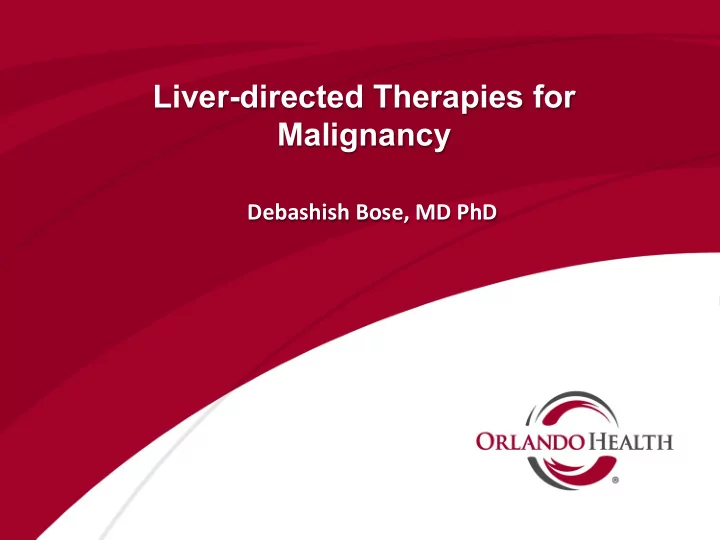

Liver-directed Therapies for Malignancy Debashish Bose, MD PhD
No disclosures
Hepatocellular Carcinoma Metasta2c Neuroendocrine Later: Metasta2c Colorectal Surgical resec2on Abla2ve techniques Mul2disciplinary issues
Table 80.1 Incidence of Hepatocellular Carcinoma According to Geographic Area and Distribution of Risk Factors GEOGRAPHIC RISK FACTORS AGE-ADJUSTED INCIDENCE RATE (%) Hepa22s C Hepa22s B Area Male/Female Alcohol Other Virus Virus Europe 60-70 10-15 20 10 Western Europe 5.8/1.6 Southern 9.8/3.4 Northern 2.6/1.3 North America 50-60 20 20 — Northern 4.1/1.6 Southern 4.8/3.6 Asia and Africa 20 70 10 Aflatoxin Japan 70 10-20 10 10 Eastern Asia 35.4/12.6 Southeast Asia 18.3/5.7 Middle Africa 24.2/12.9 World 14.9/5.5
Surgery for liver tumors
So who gets surgery? Who gets transplant?
“Bridge” to transplanta2on op2ons: TACE/bland emboliza2on abla2on surgery SBRT Y90?
A randomized phase II study of individualized stereotac>c body radia>on therapy (SBRT) versus transarterial chemoemboliza>on (TACE) with DEBDOX beads as a bridge to transplant in hepatocellular carcinoma (HCC). Abstract Number: 223 Cita2on: J Clin Oncol 35, 2017 (suppl 4S; abstract 223) Author(s): Francis W. Nugent, Amir Qamar, Keith E. Stuart, Kari Galuski, Sebas2an Flacke, Chris Molgaard, Frederick Gordon, Shams Iqbal, Klaudia Urbaniak Hunter, Erin Hartnem, Krishna Gunturu; Lahey Hospital and Medcl Ctr, Burlington, MA; Lahey Hospital and Medical Center, Burlington, MA; Lahey Clinic Medcl Ctr, Burlington, MA; Lahey Clinic Medical Center, Tuns University School of Medicine, Burlington, MA; Univ of Michigan, Ann Arbor, MI Variable SBRT (N = 13) TACE (N = 16) C-P Score 5.91 5.73 Cancer Stage 1 83.3% 93.3% Side Effect (Any Grade) (comple2on of SBRT) (following TACE #1) Fa>gue 72.7% 93.3% Pain 72.7% 86.7% nausea 36.36% 46.7% anorexia 0% 33.3% Hospital Days 1 100.0% 13.3% 2 0 % 86.7% As a bridge to transplant, could SBRT be bemer tolerated…
…and more effec2ve? B. TIME TO RETREATMENT Variable SBRT TACE # randomized 13 16 # w/ fu info (n = 4 ac>ve excluded) 11 14 # pts retreated 0 4 Kaplan-Meier est. of % re-tx …..at 3 mo 0.0% 8.3% …..at 6mo 0.0% 18.5% …..at 9 mo 0.0% 38.9% …..at 12mo 0.0% 38.9% Median # months to retreat not es2matable not es2matable
Alterna2ve Liver-Directed Therapy Op2ons RFA SBRT SIRT HAI
Single arm RFA studies Author/year # pts (tumors) Approach local rec survival Solbiati/01 117 (179) perc 39% 3y 36% Gillams/05 73 (174) perc NR 5y 25% Jakobs/06 68 (183) perc 18% 3y 68% Amersi/06 74 (213) perc, lap, open 24% 5y 30% Abitabile/07 47 (174) perc, open 9% 5y 21% Siperstein/07 234 (665) lap 18% 5y 18% Sorensen/07 100 (332) perc, open 11% 4y 26% Veltri/08 122 (199) perc, open 26% 5y 22% Gillams/08 40 (40) perc 42% 5y 40% Sofocleous/11 56 (71) perc 51% 3y 41% Courtesy of Michael D’Angelica, MD
Limita>ons of RFA Courtesy of Michael D’Angelica, MD
Irreversible Electropora2on (Nanoknife)
Electric fields open holes, PORES, in cell membranes
Neuroendocrine Tumors: Resec2on of Liver Mets and Laparoscopy Overview of liver directed strategy Evidence and Guidelines Chemoemboliza2on Outcomes for metastasectomy with cura2ve Radioemboliza2on intent Surgery Outcomes for debulking Liver surgery Future strategies Anatomic vs debulking Timing and indica2ons Periopera2ve issues Minimally invasive strategies Robo2c/laparoscopic resec2on Periopera2ve issues
Liver Surgery for NET Mets Glazer et al., 2010
Primary Resec2on and Liver Resec2on Gajoux et al., 2012
Midgut NETs, Size, and Metastasis Strosberg, 2012
Transplant
Surgery Remove primary (segmental resec2on) with associated mesentery or grossly involved nodes Extended resec2on (anatomic) with lymphadenectomy Lymph node mapping? Synchronous resec2on/debulking of (liver) metasta2c disease
The F Future o of L Liver-Di -Direct cted T Therapy y Tumor-d -direct cted tr treatm tment t Molecu cular t targeting Nanoparticl cles Augmented r reality y surgery y
Recommend
More recommend